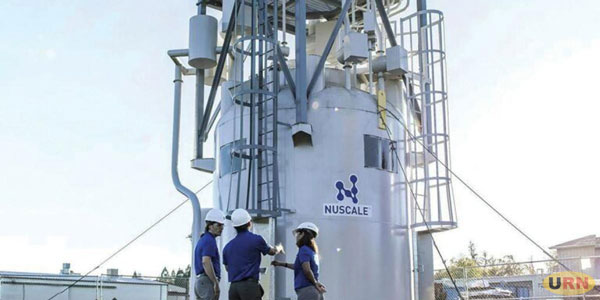
ANALYSIS | THE INDEPENDENT | High Assay Low Enriched Uranium (HALEU) is gaining popularity in some of the developed countries as a less costly fuel for putting up nuclear power plants. The current fleet of nuclear reactors runs primarily on uranium fuel enriched up to 5% uranium-235 (U-235).
This fuel which comes as Uganda prepares to build a nuclear power plant is particularly being fronted as most suited for Small modular reactors (SMRs) of capacity of up to 300 MW(e) per unit.
Nuclear features prominently in the Uganda Energy Transition Plan which was launched in Dubai in December 2023. Uganda plans to have its first 2000-megawatt nuclear power plant running by the end of 2031.
Some experts have opposed Uganda’s nuclear plant which will cost over nine billion dollars to construct. Some experts have suggested that even when countries like Uganda are endowed with huge uranium deposits, they should consider the deployment of Small Modular Reactors (SMRs).
‘It’s crucial to recognize that both large and small reactors come with their own advantages and disadvantages. Each country must carefully consider its unique needs and circumstances when deciding which option to pursue. In the case of Africa, financial, political, and infrastructure challenges hinder the adoption of large-scale nuclear power plants,” said one report that URN has seen.
Uganda has another choice with the emergence of High Assay Low Enriched Uranium. It takes between ten to fifteen years to have a nuclear power plant up and running. Nuclear power is envisaged to contribute to the electricity generation mix in Uganda by 2031.
Under the Nuclear Power Roadmap Development Strategy and Vision 2040 Uganda hoped to have 30,000 Megawatts of nuclear power by 2026. AF-Consult Switzerland in 2014 said Uganda would need to invest USD 26 billion to have an installed capacity of 4,300 Megawatts of power from nuclear energy by 2040.
AF-Consult Switzerland estimates that Uganda would spend 744.8 trillion Shillings in capital and operating costs if it is to generate 30,000 Megawatts from nuclear as outlined in the Uganda Vision 2040.
Small reactors
Small modular reactors have a capacity of about one-third of the generating capacity of traditional nuclear power reactors. SMRs are being preferred because they can produce a large amount of low-carbon electricity.
The International Atomic Energy Agency (IAEA) this week highlighted the potential of High Assay Low Enriched Uranium (HALEU) in the deployment of nuclear energy technology.
“HALEU fuel will enable smaller designs, longer operating cycles and increased efficiencies,” said Olena Mykolaichuk, Director of the Division of Nuclear Fuel Cycle and Waste Technology at the IAEA.
“However, to reap the full benefits of HALEU fuel, some countries are boosting production capacity to ensure that sufficient supply is available, which will be critical for SMR deployment.”
At the UN Climate Change Conference in Dubai, more than 22 countries called for a declaration to advance the aspirational goal of tripling nuclear power capacity by 2050, as well as statements by the IAEA and the nuclear industry, underscoring the momentum building behind the world’s second-largest source of clean electricity.
HALEU is produced in the Russian Federation and the United States of America, mostly for use in research reactors and for possible use in operating light water reactors.
The facility in Russia is currently the only one that manufactures HALEU on a commercial scale. Last month, Britain became the first European country to launch a program for high-tech uranium so the next generation of nuclear reactors are not dependent on imports from Russia.
The Government allocated £300 million to develop high-assay low-enriched uranium (Haleu) in a bid to cut Vladimir Putin out of the UK’s future energy needs.
Claire Coutinho, the Energy Secretary, said: “We stood up to Putin on oil and gas and financial markets; we won’t let him hold us to ransom on nuclear fuel. “Britain gave the world its first operational nuclear power plant, and now we will be the first nation in Europe outside of Russia to produce advanced nuclear fuel.
“This will be critical for energy security at home and abroad and builds on Britain’s historic competitive advantages.” Meanwhile, the United StatesNuclear Regulatory Commission also authorized the start-up of high-assay low-enriched uranium enrichment, or HALEU, operations in Ohio. The authorization marked a critical first step in producing advanced fuels for the next generation of nuclear reactors.
Last year, the Euratom Supply Agency produced a report on the future fuel supply for Europe’s HALEU-converted, or soon-to-be-converted, research reactors. Traditionally, Europe’s research reactors have been fuelled by high enriched uranium.
The Euratom Supply Agency estimates that, by 2035, the European Union will need between 700 kilograms and a ton of HALEU each year to keep its research reactors in operation. This estimate does not include any future demand from advanced reactors used for power generation. Euratom therefore recommends that the EU develop its own capacity to produce HALEU fuel, due to concerns over the future security of supplies. Nuclear power had been in decline since the Fukushima disaster in Japan over ten years ago, but the International Energy Agency IEA) in a report Nuclear power and secure energy transitions: From today’s challenges to tomorrow’s clean energy systems in 2022 said it was making a comeback.
“In today’s context of the global energy crisis, skyrocketing fossil fuel prices, energy security challenges, and ambitious climate commitments, I believe nuclear power has a unique opportunity to stage a comeback,” said IEA Executive Director Fatih Birol.
****
URN
 The Independent Uganda: You get the Truth we Pay the Price
The Independent Uganda: You get the Truth we Pay the Price






I ɗоn’t even understand how I stopped up here, but I thought this publish was
great. I ddo not recognizе who you’re howеver certainly you’re ցoing to а
well-ҝnown blogger should you aren’t already. Cheers!
Have a look at myy site taming io